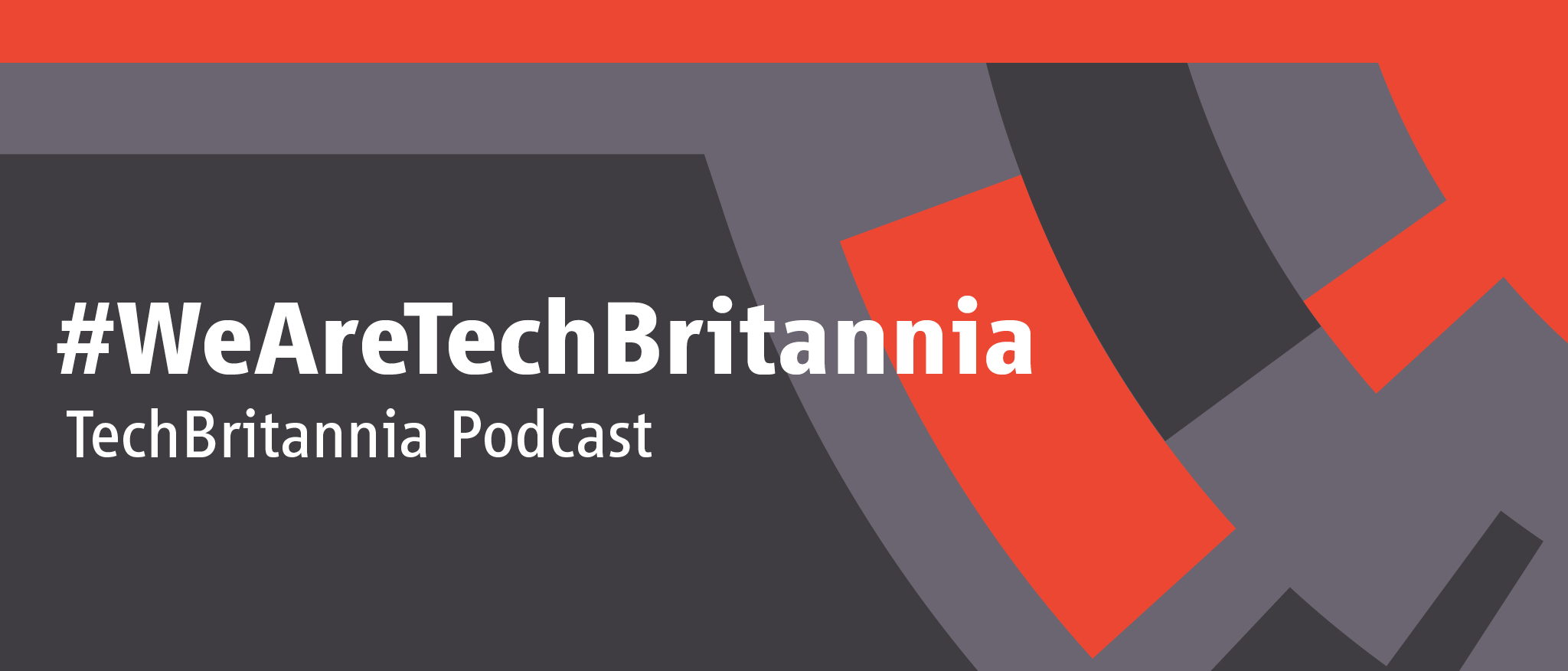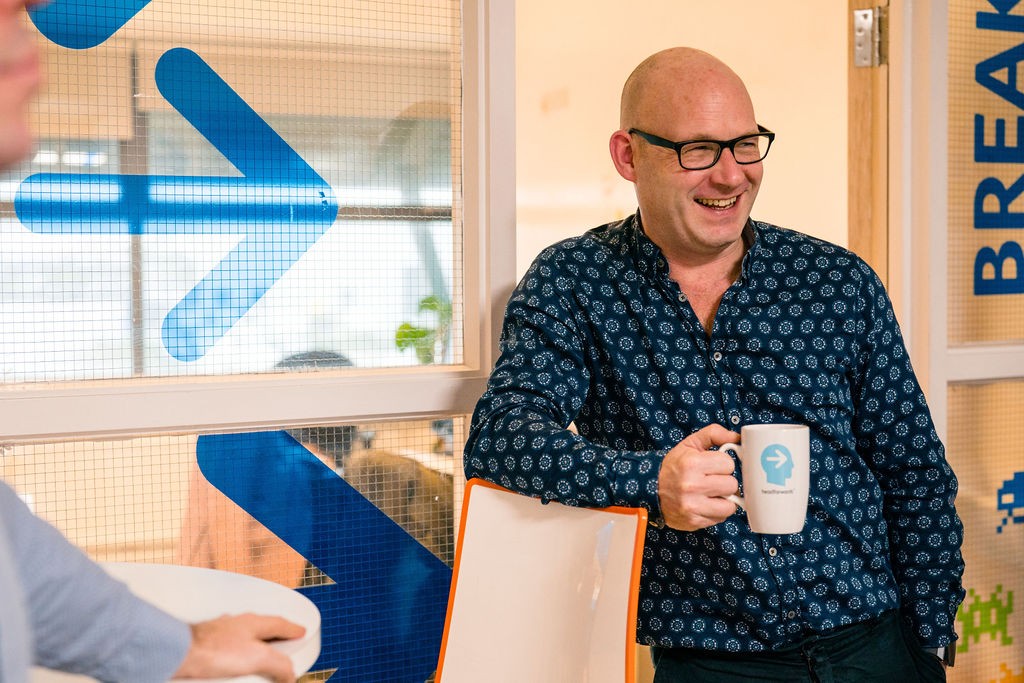Young UK enterprise up for Junior Achievement European award: Matt, Managing Director, Firefly Technology
Posted on 8th July 2021 by Jon Howell

Today we have the pleasure of chatting with Matt, Managing Director of Firefly Technology, who shares the story of how ten schoolboys came together to form a company and create a innovative piece of technology that’s ideal to solve one of the core problems that many people have suffered in the new work-from-home environment, the issue of being disrupted.
TechBritannia Co-conspirator Rose Ross discovers how the “Do Not Deskturb”, which comes in two versions, found its way to being a success and how Firefly, having been part of the Young Enterprise program, has won “Best Overall Company UK – Company of the Year Winner 2021” and is now representing the UK at the European finals.
You can watch Firefly Technology’s introduction video here:
Matt heartily recommends everyone to check out the competition and also vote, which you can do on their website. Listen to the full podcast here:
YouTube:
Also available on:
Interview transcript:
Rose Ross: Hello everybody and welcome to the We are TechBritannia, the podcast that looks at what’s happening in technology. I’m delighted that today we will be speaking with Matthew who is the managing director of Firefly Technology. They are the Young Enterprise Young Company of the Year, the winners in the UK, and they are heading off to Europe.
So, hello Matthew, thank you for joining us.
Matt: Hello, thank you for inviting me, it’s my first time doing anything like this and I can’t wait.
Rose Ross: Fantastic. Well, we’re looking forward to hearing more about what you guys are doing, and I came across it on social media, so it just goes to show that all the work that everybody’s doing to share the social media love is working! So, you get your opportunity to be in the spotlight.
So, tell us a little bit more about this win that you guys have had, and how this all came about. So, you’re from… just to say, you’re not just from the company, you’re also a sixth form student and you’re part of a team of your colleagues at RGS in Guildford. So, perhaps you could just set the scene for what you guys are doing on a day-to-day basis, and as people would say in the business, your new side-hustle here.
Matt: Yes, exactly. Back in September one of the programs that our school offers is from a national charity called Young Enterprise, and they want to encourage more people to get into business through encouraging them to start companies and run them for a year. And along that the companies sort of get judged at regional/national levels against one another in a competition like that. So, come September we’ve just finished the pandemic, everyone’s back in school – well, not finished the pandemic!
Rose Ross: Unfortunately not.
Matt: We’ve just finished online learning. Yeah, unfortunately that would be fantastic but we’re just back in school for the first time, and one of things that school said is “does anyone want to do this? [the Young Enterprise programme]” So, we had a couple of teams at the school but my team had ten of us and we were perhaps formed a little bit more informally, we were more sort of, ‘Who fancies this?’ that hasn’t gone to the effort of forming a team in advance. So that was us, we sort of scooped up everyone still remaining, and we decided that we were going to give it a really good shot. We had to go through the whole process of thinking up an idea, actually making the idea, selling it, going through all the rounds, whilst balancing that as you pointed out, with being students, sixth form students.
So, at times it was easy and at times it was quite hard, especially when you get that horrible day where you get a couple of homeworks at once, and then you’ve got to do a meeting in the afternoon, or something like that. So, we formed very informally and since then it’s been a great journey.
Rose Ross: Or, God forbid, you have to record a podcast for some crazy person who wants to talk about British technology! But hopefully this isn’t going impact your homework schedule too vastly.
So, you’re based in Guildford, you’ve got the best of the rest, so you’ve got 10 of those who didn’t go into other teams but didn’t work out to badly for you in the long-run did it, seeing as you won overall across the UK.
Matt: Well exactly. I think part of that is actually related to it. I think the fact that we formed sort of more informally, you can avoid the trap of maybe as some other teams had which is just forming as a friendship group or things like that. We ended up having a really diverse range of skills and personalities because of that informal process. So, I really think that did come out to help us.
Rose Ross: Brilliant, so it just goes to show doesn’t it, it was better but not by design.
Matt: Yes, it was fortuitous actually.
Rose Ross: Fantastic, well we always like a bit of fortuity. It doesn’t hurt, a bit of hard work and luck combined is often how these things come about.
So, we’ve talked a bit about the competition and we’d be very curious as to see as how you 10 are going across to this European stage, slightly reminiscent of a certain game which is going on at the moment which involves goals, lots of grass, a ball, and a referee and whatnot. But what are you doing in Europe, what’s happening there that you’re now taking your business, taking Firefly Technology to the European stage?
Matt: Yes, so Young Enterprise is sort of part of a bigger charity in Europe which spans, I can never remember, it’s either 26 countries or 40 countries, and the winner of each country’s national competition go out to Europe to compete against one another. And in a typical year, actually, in a non-pandemic year, that involves flying out to the host nation, doing in-person interviews with a panel of respected judges from that country, and things like that. So this year it;s Lithuania, so we’d have been jetting out to Lithuania, unfortunately that’s now all on Zoom and Teams, but effectively we produce a business plan, we do some interviews and sort of an elevator pitch of the company, for a panel of judges in Europe who will stack us up versus the best of the best Europe has to offer.
Rose Ross: Fantastic, so you’re a startup of those starting out in their careers which is really exciting. So, when is this all taking place, and how can listeners support you? I know that there was a call for support on this, is there a bit of judging that the public can get involved with as well?
Matt: Yes, we’ve got a bit of a call to action, so between the 29th of June and 15th July there is a public choice award which is, how many votes can your company drum up, and the company within Europe that drums up the most votes is the winner, and we think, to the British public, we can definitely do it. So, we would love it if you could go out and go to the site, I assume there’ll be an opportunity, if possible there’ll be an opportunity to have a link somewhere and then they can click on that link.
Rose Ross: Yes, we’ll get a link posted in with the blog.
Matt: Perfect yeah.
Rose Ross: So people can go, and obviously we’ll put it on social media as well.
Matt: Yeah, so you can go through that link and vote hopefully for us, but obviously you’re well within your rights to vote for anyone else as well, and hopefully we can get the most.
Rose Ross: Clearly nobody listening to this is going to, they’re going to go, ‘I’m obviously going to vote for you!’
Matt: Yeah, well that’s the intention but you don’t want to be too presumptive, there’s some quality competition out there!
Rose Ross: I’m sure there is, I’m sure there is.
Matt: Yes, we would very much like it if you would vote for us, and hopefully we can get the most votes of any country.
Rose Ross: Absolutely, and to bring the trophy home as well.
So, tell us about the project, because I love this and I actually was going to order one, and now they’re going to go, why didn’t you! Because, obviously doing podcasts, I’m doing them in the dining room and one of my issues is that from time to time a certain person of the age 17 may well wish to join, because there are a number of things in the dining room that he suddenly has a requirement for.
So the ‘Do not Disturb’ and I think we’ve seen lots and lots of footage and perhaps this was part of your inspiration, of rather annoyed parents being perhaps interrupted by children or just generally interrupted, because work is now at home, and home doesn’t always respect that work is there. So, tell us a little bit about what you have come up with.
Matt: Yeah, so at the start of lockdown when we were doing online learning and our parents were working from home, we were the interrupter, we were the person who wanted to get into the room and did not know if they were on a video call, or not. We thought how great would it be if I could just know. So we made the Do Not Disturb, and it’s a smart sign which will sync with your calendar through our web app which we coded ourselves to automatically turn on and off at the start of calendar events; so whether that be a Teams call or a Zoom call. So, basically if you’re in a meeting the sign will be on and everyone around you knows, look don’t disturb me right now, I’m recording a podcast in your case, and if you’re not it will be off and it’s free to come in or ask a question, anything you fancy.
It’s quite a small thing but the implications of it we think can be really powerful, because interruptions even before working from home were incredibly widespread with some studies showing actually that you’re interrupted on average every 11 minutes, which can be really-really damaging to productively working and getting things done. You sort of get to the end of the day; you’re wondering where all the time went. By genuinely making conscious decisions as to, now I don’t want to be disrupted I’m doing a piece of focused work now, or I’m on a call and I want the world to know that so that no-one disrupts us, it can be really impactful, not only in professionalism, so not getting interrupted, but also saving you a lot of time and energy.
Rose Ross: Definitely, definitely. So, obviously people can order from the website if they feel that [alarm bell sounds] oh look! Obviously they didn’t see the sign, right?
Matt: What did you say?
Rose Ross: They obviously didn’t see the sign, ‘Do not disturb’.
Matt: No, exactly, exactly. I’m sorry.
Rose Ross: How rude, so rude! So, obviously this was inspired by the situation that everybody found themselves in; and have your parents already personally thanked you, because I’m hoping that they are using it themselves.
Matt: Yeah, they were the first users actually, they got to enjoy the wonders that come with the prototype of a product and all its spottiness that’s associated with it! So, it’s definitely been really useful. I imagine more for me than them actually, because if you want to ask them a question, whereas before you might just have knocked, or I personally, well not now, you know when it’s time to go and feel comfortable.
Rose Ross: Yes, absolutely. And how did you all find the process of creating the product and the business, because obviously this will be the first time you guys have been that closely involved with these types of things.
Matt: Yes, it’s been an absolutely massive learning curve, and one of the key things from that is, as you say, you’re sort of doing two things, you’re building a product and you’re building a business around it. I think initially for us the hardest part was definitely building the product and doing the tech behind it, because when we were in the idea stage we actually had this idea, and we’d sort of thought ‘well this would be great but we don’t know how to make it, so let’s go look for something else’. And in the end we decided, actually we’ve got a good idea so we need to go and find a way to make it, rather than looking for something we already know how to make.
So, that decision forced upon us lots of small things like, we had to learn how to do 3D modelling, to do 3D printing, or we had to learn how to code to build our web app, things like that. So the technical side is just a huge number of little skills that we never had before, but as a team I think we’ve really grown from that.
And then again, running a business, it’s not something any of us had any experience with and all of the marketing, the sales management that comes with that has been just as challenging and useful as a learning experience.
Rose Ross: And technology-wise, because I know… how have your teachers – how involved have they been in the process, because I don’t think this is some… Do you do most of this informed by Young Enterprise, or are your teachers or your lecturers also getting involved with the process?
Matt: So, you have a centre lead, sort of a teacher at the school who runs the programme, who has been fantastic for us. She’s been really willing and really helpful from the start in giving us ideas, prompting us to make sure we do things, and just generally being a great influence. Then you also get given a business advisor, so you’re paired with someone in the community around you that’s maybe run a business or worked in a company for a long time and has some of that business knowledge, because I think if you’re truly doing it with no-one to ask, no form of a mentor initially, it can be so daunting that taking those first few steps is really difficult, and he’s been fantastic as well. He worked in tech, so he was our first introduction to tech and what it can do, and that was really beneficial for us as well, in terms of just showing us that maybe you could do something like this, or how you can use tech in the company.
I think that’s been one of our biggest learnings, is that tech not just… for example, in our product we have an electronic system or an app, but also in using Google Analytics to track your website, or it can be really useful across marketing as well as the product, and every aspect of the company can be improved with tech. So, our business advisor and centre lead have both been fantastic, and we could definitely not be here without them.
Rose Ross: Fantastic, and they would have been looking forward to a lovely trip to Lithuania, but unfortunately it’s not to be, they get to go on another Zoom call!
Matt: Indeed, indeed!
Rose Ross: So, from all of your perspective the choice of tech, is that something the way you think that a lot of you will perhaps… has this opened your eyes to a career in technology? Do you think it’s something that you personally will pursue?
Matt: Speaking personally, before doing all of this, the sort of picture of a person that works in tech is maybe overly influenced by movies, like The Social Network, or the whizz-kid hacker in a bedroom at 9pm typing so fast you can’t imagine it. It’s always seemed rather unobtainable and something that maybe other people do but you don’t really know what to do yourself. So, it’s definitely shown me that you can get stuck-in at a lower level and then just get better, and better, and better with tech. It’s definitely on my radar now, whereas it would never have been before, I had zero technological understanding before.
Speaking for the team generally, I know there’s especially a few guys who really, really got stuck into it. So, we’ve got one guy who has done a lot of our coding and he’s been phenomenal, and I’m trying to steer him towards doing that because I just think he’d be so good at it. So, it’s definitely made it seem so much more attainable for us, and so much more realistic to have a career in tech, which I think sometimes the media can make it seem sort of far away, or you have to be some whizz-kid or genius to pursue it. But I think it is taking a small project like that, that you can action and see the results of, and just expand on, it does make it all much more attainable.
Rose Ross: Wow, well that’s really insightful. I think it’s great that fortuitously steered you to a tech solution and hopefully it will at least make sure that people consider it as an option moving forward.
So, what next for the team? You obviously will be competing in Lithuania virtually; when will we know the results of that process?
Matt: Yes, we’ll find out the results on 15th July, so 10 days from when I’m speaking to you now. Hopefully it’s good! But beyond that, I think that there’s two sides to it, one is the company, we’re in discussions now as to where we want to take it next, do we make it more scalable, or how do we run it outside through A-levels and things like that. But then secondly, there’s also all the different learnings everyone has taken from it, and how they can use those, I think will also be a really interesting thing to watch, especially the rest of my team-mates because they’ve all been so fantastic, and they’ve all learnt so much. they can see over the 10 months that an individual has got far more self-confidence, or far more skill in a certain area. I think they will definitely take that and expand on that over the next few years, whether it’s for Firefly or in a different setting.
Rose Ross: Fantastic. So, we might be seeing Firefly as maybe one of the new, as they like to call it in the tech industry, unicorns, as one of the multi-billion valuation tech giants of the future.
Matt: I think almost certainly.
Rose Ross: Good, well we like to hear that confidence.
Matt: Of course, of course, we’ll be hitting a billion dollar valuation soon!
Rose Ross: Well yes, I’d expect very soon after the 15th of July, I very much hope!
Matt: Yeah, I think the big win in Europe will give us such confidence to investors that we’ll quickly reach the billion dollar market.
Rose Ross: And no lacking in the British sense of humour either! So, that’s all happening for you guys. And I suppose anything that we haven’t covered that you’d perhaps like to share with our listeners, who obviously from all walks of tech and perhaps have just stumbled across this just generally. What else would you like to share about the experience, and what it’s brought for you guys?
Matt: I would say just generally, especially with young people, letting someone learn something practically, especially in tech actually, can be really-really great, and for British tech specifically, getting the next generation of… not myself, I’m nowhere near the most talented technical person in the team, but some of the people around me I definitely think you guys would be missing a trick if you don’t get them into the tech industry, because they could do so much for it.
Programmes like Young Enterprise or other skill-related programmes can be really beneficial for that, so I would say don’t underestimate young people, and give them a chance to do something practical and to get involved with tech in a small way. It doesn’t need to be a really grand project but you need that first step and you can move on from there. So definitely, I think for the future of British tech, getting some of those people into it could be really-really powerful.
Rose Ross: Fantastic. Well I would have loved to have summed up with such great words, but unfortunately you’ve beaten me to it! And all I can say is, wishing you Matthew and the team on the 15th, the Firefly Technology team, all the very best in Lithuania, virtually. We look forward to hearing more, perhaps in a year’s time or in a few months’ time we can hear more about how things are progressing.
Certainly, if you out there are struggling as a technologist to get your work done, and to be uninterrupted when you need to think, or when you need to speak to people, or perhaps like myself when you need to record a podcast or a video interview, then I would definitely recommend that you have a look at what Firefly are doing, because not only would it be great for them to be successful in the European competition, but obviously they do actually have products for you to buy. So, I’m sure they’d be delighted if you invested in that, and hopefully we’ll get a lot of benefit from it over the ‘continuing to work from home era’ that we are now in.
Yes, thank you so much Matthew, that was really insightful.
Matt: Not at all, thank you for having me on, I mean it’s been fantastic doing something like this, and really enjoyable.
Rose Ross: Fantastic. Well I’m glad you’ve enjoyed it, I certainly have. A very inspiring tale from Guildford, the Firefly Technology team and we wish them the very best of luck in the competition.
And you have joined me, Rose Ross from TechBritannia for the We are Tech Britannia podcast, and I think we may have to rename it if we speak to other inspiring students or technologists of the future like Matthew, and perhaps we will be talking about the We are the Future of British Technology. So, thank you for listening and we will make sure that there are links to the Firefly technology website. Do you want to do a quick website callout there, Matthew?
Matt: Yes, www.firefly-technology.co.uk
Rose Ross: Perfect, so yes lots of details there and there’s a fantastic video which we will also post on the blog post. So, thank you again everyone for listening and hopefully will be supporting the Firefly technology team to bring it home.
Thank you.





Leave a Reply
You must be logged in to post a comment.